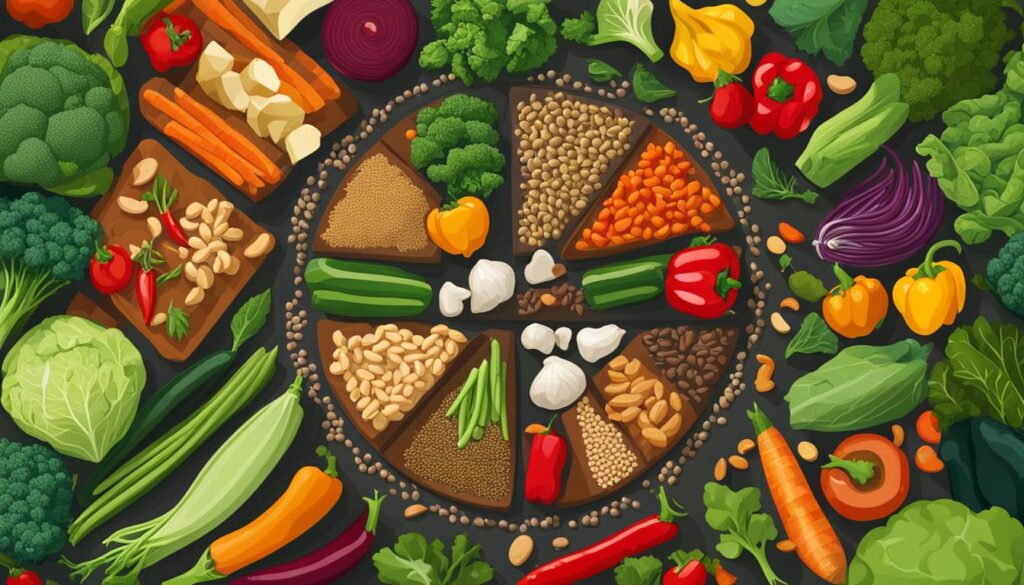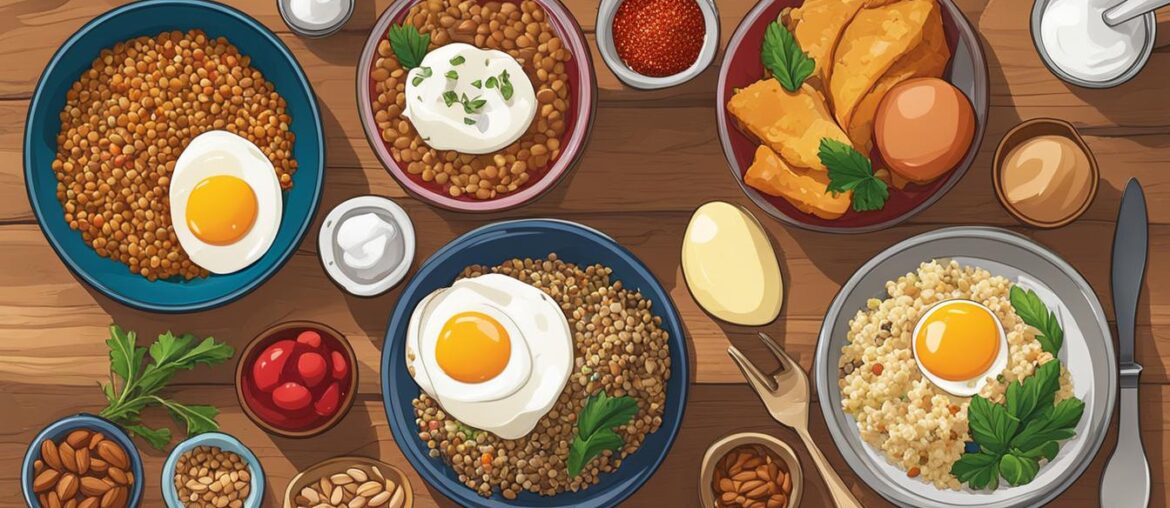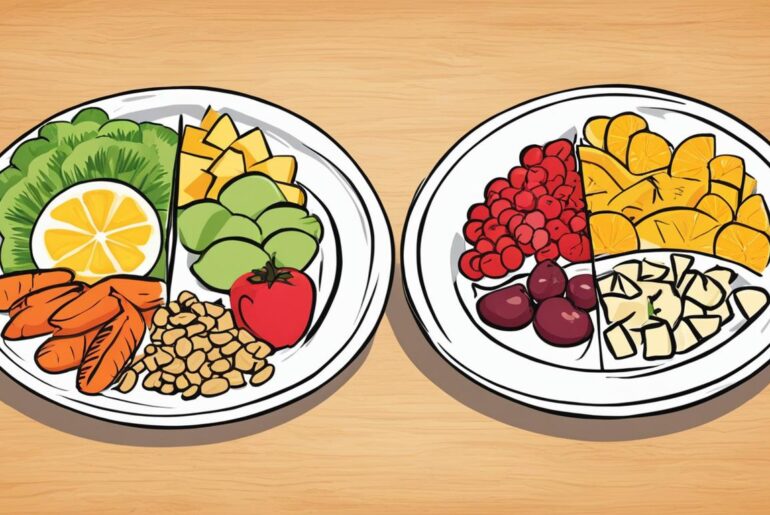Eating foods high in protein has numerous benefits, including muscle building and promoting a sense of fullness. Protein is a vital nutrient that provides the building blocks for cells and helps maintain muscle mass. When it comes to weight loss, protein-rich foods can be especially beneficial. In this article, I will guide you through some of the best high-protein foods to include in your diet.
Key Takeaways:
- High-protein foods are beneficial for weight loss due to their ability to promote feelings of fullness.
- Protein-rich foods aid in muscle building and help maintain muscle mass during weight loss.
- Some animal protein sources include salmon, chicken breast, beef, tuna, bison, pork, turkey, and halibut.
- Vegetarian and vegan options for protein include eggs, Greek yogurt, cottage cheese, milk, nut butters, black beans, lima beans, broccoli, cauliflower, oats, tempeh, spirulina, and hemp seeds.
- The optimal protein intake for weight management may vary based on individual factors, such as age, sex, and physical activity level.
High-Protein Foods for Weight Loss: Animal Protein Sources
When it comes to weight loss strategies, incorporating lean protein into your diet can be extremely beneficial. Animal protein sources are often considered complete proteins, as they contain all essential amino acids necessary for the body's functions. Not only do these high-quality proteins help build and repair muscles, but they also promote feelings of fullness, making it easier to stick to a weight loss plan.
To optimize weight loss and natural weight loss, consider including the following animal protein sources in your diet:
- Salmon
- Chicken breast
- Beef
- Tuna
- Bison
- Pork
- Turkey
- Halibut
These protein-rich foods not only provide the necessary nutrients for weight loss but also offer a variety of flavors and textures to keep your meals interesting and satisfying. However, it's important to note that when selecting animal proteins, opting for lean cuts is crucial. This helps limit the intake of saturated fats, promoting optimal heart health and overall well-being.
Below is an image highlighting some of the animal protein sources mentioned above:
By incorporating lean animal protein sources into your weight loss strategies, you can enjoy delicious meals that keep you satiated while supporting your natural weight loss journey.
High-Protein Foods for Weight Loss: Vegetarian and Vegan Protein Sources

For individuals following a vegetarian or vegan diet, there are plenty of plant-based protein sources that can support weight loss goals. Incorporating these protein-rich foods into a balanced diet can provide the necessary nutrients while promoting a healthy body composition.
Here are some of the best vegetarian and vegan protein sources:
- Eggs: Eggs are not only an excellent source of protein but also packed with essential vitamins and minerals.
- Greek yogurt: Greek yogurt is a versatile and protein-packed option that can be enjoyed on its own or added to smoothies and snacks.
- Cottage cheese: Cottage cheese is known for its high protein content and can be enjoyed as a standalone snack or incorporated into recipes.
- Milk: Milk is a good source of protein and can be consumed on its own or used in cooking and baking.
- Nut butters: Almond butter, peanut butter, and other nut butters not only provide protein but also healthy fats.
- Black beans: Black beans are an excellent vegetarian protein source and can be included in salads, soups, and main dishes.
- Lima beans: Lima beans offer a good amount of protein and can be used in a variety of recipes, from stews to casseroles.
- Broccoli: Broccoli is not only rich in protein but also packed with vitamins, minerals, and fiber.
- Cauliflower: Cauliflower is a versatile vegetable that can be used to create plant-based protein-rich dishes like cauliflower steaks and stir-fries.
- Oats: Oats are not only a great source of fiber but also contain a decent amount of protein, making them a satisfying breakfast option.
- Tempeh: Tempeh is a fermented soy product that is rich in protein and can be used in place of meat in various recipes.
- Spirulina: Spirulina is a blue-green algae that offers a complete source of plant-based protein, along with essential vitamins and minerals.
- Hemp seeds: Hemp seeds are a nutritious source of plant-based protein, omega-3 fatty acids, and other essential nutrients.
These vegetarian and vegan protein sources provide a wide range of nutrients and can be enjoyed in various recipes and meals. Whether you're following a vegetarian or vegan diet or simply looking to incorporate more plant-based proteins into your meals, these options offer a delicious and nutritious way to support your weight loss goals.
| Vegetarian and Vegan Protein Sources | Protein Content per serving (grams) |
|---|---|
| Eggs | 6 |
| Greek yogurt | 17 |
| Cottage cheese | 14 |
| Milk | 8 |
| Nut butters | 7-8 |
| Black beans | 15 |
| Lima beans | 11 |
| Broccoli | 3 |
| Cauliflower | 2 |
| Oats | 6 |
| Tempeh | 16 |
| Spirulina | 8 |
| Hemp seeds | 10 |
Protein Intake and Weight Management
When it comes to weight management, ensuring an optimal protein intake is crucial. However, the amount of protein needed varies based on individual factors such as age, sex, and level of physical activity. The Recommended Dietary Allowance (RDA) suggests a daily intake of 0.8 grams of protein per kilogram of body weight.
However, recent research indicates that higher protein intake can have additional benefits for weight loss, reducing body fat, and maintaining muscle mass. In fact, studies have shown that increasing protein intake to up to 1.6 grams per kilogram of body weight can lead to significant weight loss.
“Higher protein intake can promote weight loss, reduce body fat, and help maintain muscle mass.”
Incorporating protein-rich foods into your diet can have a positive impact on weight management. Protein promotes satiety, making you feel fuller for longer periods and reducing the likelihood of overeating. Additionally, protein has a higher thermic effect compared to carbohydrates or fats, meaning that your body burns more calories while digesting and metabolizing protein-rich meals.
Consulting with a healthcare professional or registered dietitian can help determine the right protein intake for your specific needs. They can take into account your individual goals, preferences, and any underlying health conditions to provide personalized guidance.
Remember, successful weight management is not solely about protein intake. A balanced diet, regular physical activity, and a consistent lifestyle are essential for sustainable weight loss and overall well-being.
Conclusion
Incorporating high-protein foods into your diet can be a powerful strategy for healthy weight loss. Protein not only helps promote feelings of fullness, but it also supports muscle growth and increases metabolic rate. Whether you prefer animal or plant-based protein sources, it's crucial to focus on maintaining a balanced diet and incorporating a variety of nutrient-rich foods.
Consulting with a healthcare professional or registered dietitian can provide you with personalized guidance on protein intake and effective weight loss strategies. They can help you determine the optimal protein intake for your specific needs and goals.
By optimizing your protein intake, you can enhance your weight loss journey and support overall health and wellness. Remember, a high-protein diet is just one piece of the puzzle. It's important to combine it with regular physical activity and a holistic approach to nutrition for long-term success.




